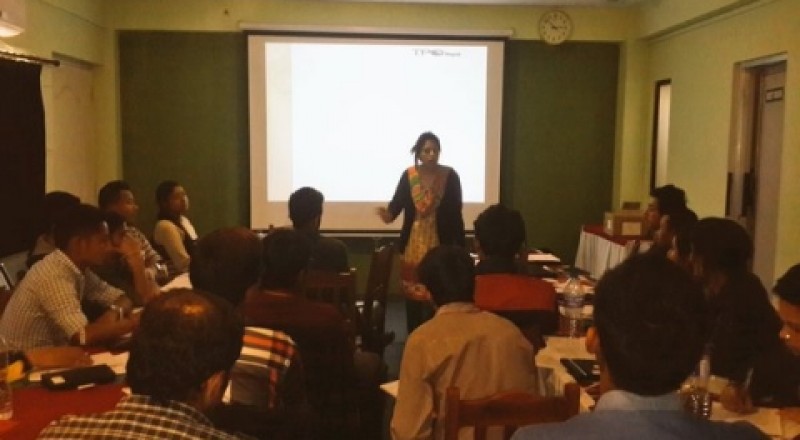A six-day training session for the project ‘A Descriptive Analysis of Injuries and Risk Factors in the 25 April, 2015 Nepal Earthquake’ was held from 28th March to 2nd April. A total of 27 researchers participated in the training programme. Training sessions were conducted by joint team of HERD International, National Society for Earthquake Community (NSET) and Transcultural Pyschosocial Organization (TPO) Nepal. This project aims to identify the causes of injuries and deaths caused in the April 25 earthquake, in order to provide a scientific basis for education and training of the Nepali people in basic disaster preparedness and mitigation. Content of the training sessions included discussion on the study methodology; identification of structural and non-structural components of a building/ structure; concept of preparedness, mitigation and risk reduction techniques; quantitative research and psychosocial approach during data collection.
The findings of this project shall provide a clear picture about the specific risk factors associated with injuries; nature of hazards in the built environment and building typologies that could have specific risks for human casualties; specific risk mitigation efforts that will decrease deaths and injuries; and specific behaviour during and after an earthquake that could decrease deaths and injuries. The research is being conducted at Kathmandu, Bhaktapur, Nuwakot, Sindhupalchowk and Kavrepalanchowk.
A one-day field trial was conducted in Kirtipur Municipality with the objective of exploring the complications of actual setting, testing of tools whether it is relevant and appropriate in terms of language, test the tablet functioning, identify potential problems dealing with community coordination and calculate the time required to conduct an interview.
Standard Training Practice at HERD
The training for field researchers at HERD is generally provided by the core research team and study specific resource persons. We orient researchers about the general background of the subject matter of the project and also on specific area of the research study to set the understanding and context for data collection process. This orientation is followed by training on the study methods and tools, both in general and specific to the study. The theoretical understanding on the methods and tools is complemented with the orientation on the tools to be used in the particular study. The core team will thoroughly orient the researchers in the tools through discussions. There is always a risk in ensuring that the participants have understood what has been delivered during the training and this has direct implications on the quality of data generated through fieldwork. Therefore, we have a practical approach to control the risk.
During the training, the participants conduct mock interviews and field trial in a selected location apart from the study sites. They are also trained on how and what to write about the process of conducting interviews and other data collection methods. The core team provides immediate feedback on the practice sessions. The training also emphasizes on ethical practices during the fieldwork emphasizing respecting the respondents/participants in the study, maintaining confidentiality and safety of the participants and the data.
Project Team Members’ Perspectives

Bhagiman Lingden, Field Monitoring Officer
Compared to other projects, this project has been a complex one as I hadn’t been involved in similar projects before. The tools and the research for this project was related to building infrastructures which was new to us. Initially, we faced some difficulties in explaining the researchers about the tools. However, with good cooperation from our project partners, Save the Children, NSET and TPO Nepal, we were able to conduct the training in an efficient manner.

Santosh Giri, Data Management Officer
This time we changed the modality of training to make training sessions more interactive. Earlier, we used first of all provide the theoretical concept of the content then move towards practicing using tablets. However, this time, this time we went through the content and practicing using tablets parallelly. One of the advantage was that the researchers were familiar with tablet applications while they were also understanding the tools. Furthermore, the hands-on experience with the tablet was quintessintial to provide them with the basics of troubleshooting and the organization of the application which they applied in the field trial at Kirtipur.
The data collection for this project has begun with the researchers deployed to their respective field locations.



Comments(0)
No comments found.